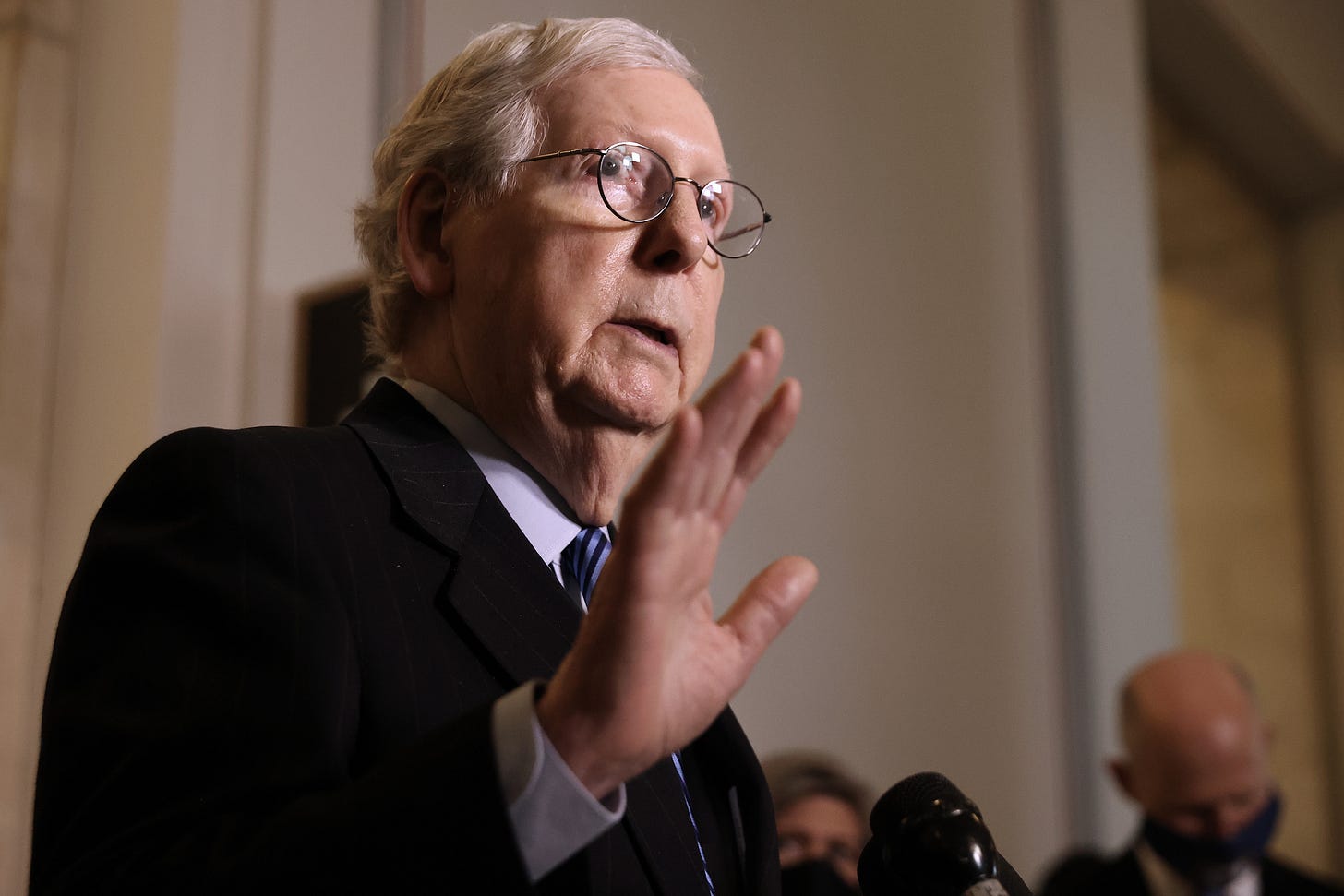The Press and the Party of No
The Biden Administration is finding a familiar answer to everything it is trying to do from the Republicans on Capitol Hill. It is the same answer that Biden saw up close when he was Vice President in the last Democratic administration. No matter the issue or the topic, it seems that when it comes to legislating around the challenges that face this country, the Republican answer is simple, unequivocal, cynical, and final: No.
Many have commented, myself included, on how broken and dangerous this system has become. I believe the American experiment in self government works best when it has two strong, principled political parties who come to the table with well-formed and well-intentioned solutions to the challenges of the nation. This has been demonstrated repeatedly throughout our history, and I have seen good ideas and good candidates come from both parties. I have supported Democrats and Republicans with my vote. And, however it may appear at any given time, as a reporter I try to pull no punches, play no favorites in covering the parties. What is happening now isn’t about policy it’s about whether we can have a functional government.
There has always been a place for obstruction in politics. Sometimes it’s a matter of principle. Sometimes it’s a negotiating position. Sometimes it’s a seeking of momentum leading into an election cycle. But that an entire political party would stand in lock step trying to undermine an entire presidency just because that president was from a different party? Well not even Newt Gingrich tried that. It has been the scorched-earth political tactics pioneered by Mitch McConnell - power for power’s sake, norms and comity shattered, the needs of the country be damned.
All of this discussion leads to questions over the filibuster, voting patterns, gerrymandering, and all sorts of ugly histories around race, power, and representation in Congress. It is obvious that the Founding Fathers, despite their faults, intended to set up a system of government that had the power to solve problems. That’s why they did away with the Articles of Confederation. But now we have many members of Congress whose entire reason for being there is to gum up a system designed for action. They are showboats promoting a nihilistic brand that threatens the well-being of our nation and makes a mockery of the idea that we have a legislature.
One sign of how broken this system is: even when Republicans held both houses of Congress and the White House in the first two years of President Trump’s administration, they passed almost no bills that addressed problems even they claimed to care about. The perpetual “Infrastructure Week,” turned onto a joke of inactivity - infrastructure “weak.” It appears that the modern Republican party can’t get to “Yes” on anything other than judges and tax cuts. I think part of the reason for this is that a lot of what the party believes at its elite levels is so unpopular that they dare not actually pass bills that give unfettered power to rapacious business interests. They would rather save that for executive actions and the guise of “de-regulation.” There is a lot more to say on this topic, and I plan to return to it later, but in the meantime, I think an understated component of this “politics of no” dynamic is the way the press covers it.
When I first went to Washington as a reporter, to cover the White House in the Johnson Administration, it was in the immediate wake of the Kennedy assassination. We had no way of knowing that the new president would usher in one of the most consequential flurries of domestic legislation in American history. Johnson was of course a master of the Senate, and the old (to be candid, often ugly) ways in which power could be leveraged. But he was focused on results, and he got them on everything from civil rights to health care to education to the arts.
Then, as the Nixon years began, I was there reporting on tides of power that were very different from before. But still, there was positive activity on Capitol Hill. Nixon, as we would come to learn, was driven by such hatred of his political opponents (and those he perceived as hostile in the press) that he would drive his own fortune into ruin. But even with that mindset, he was able to accomplish a great deal by working with Democrats--and principled Republicans-- in Congress. And when it was time for him to go, the response was bipartisan as well.
Now, it is easy to glorify the past. These Congresses that “worked” also worked to perpetuate systems of government and society that were unjust and unequal. Some of the horse-trading that was done back then bartered basic rights and societal provisions that we would recoil at today. And those who served in these Congresses were far less representative of the full diversity of the nation. All that said, if the spirit of action that drove them existed today, I suspect our progress on racial justice, voting, guns, the environment, education, and many other big issues would be far more robust. For starters, it would exist.
And that brings me back to the press. It is impossible and I would argue irresponsible to try to cover Washington as we did in earlier eras. Every story, every reporting angle, must begin with the understanding that one of the two political parties doesn’t try, at least on the national level, to legislate solutions to our problems. The burden for asking why we don’t have bipartisanship to solve major problems shouldn’t be primarily on those making the legislative proposals. Negotiating doesn’t mean saying “no” and walking away. It means offering counter solutions or ideas. It means acting in the best interests of the nation, not in scoring political advantage often at the expense of those in need.
I understand it is difficult for reporters to cover politics in this manner. Contrary to the politically-motivated attacks on the press, I do believe most reporters try to be as fair as they can. They are loathe to be seen as tools for particular political ends. But this instinct is being weaponized by those who want to break government, and the American system more generally. We have seen from those who delegitimize a fair election and seek to suppress the vote that they are eager to create scapegoats in the press for reporting on these outrages. And they are poised to do the same if they are called out as the party of no.
But our hope is that journalists do not bend to the pressure. Rather than take every new issue or bill as a separate case, I would respectfully encourage my peers in the press to do more digging into the general systemic dysfunction. For example, when interviewing members of Congress don’t treat their opposition to the issue of moment as separate to their oppositions in the past - including to recognizing the results of the last presidential election.
The optimist in me believes that the majority of the American public would like a government that works to solve problems. This does not mean giving up one’s own beliefs. And there are issues on which you will never find compromise. We need different approaches to battle in the marketplace of ideas. None of us has a monopoly on wisdom. Far from it. But for this system to work you need to be able to get to “Yes” on some things. You need to have a system that functions. And when that isn’t happening, when our political process is being crippled by cynical actors who have learned they can keep a grip on power by blowing up the government and then blaming failure on their political foes, we need to report on this reality. It is a story of incredible importance and in many ways the future of our nation is resting on getting it told.
—Dan




Mr. Rather, I would encourage you to send your essay to the managing editors and publishers of the NYTimes, WaPo, Time and Newsweek magazines, The Nation, The Atlantic, and to the heads of the news departments of the three main broadcast networks, PBS News hour, and the big cable news outlets (including Fox "News"). They need your reminder that coverage of the Republican party and its so-called "representatives" can no longer be handled as if they were still an actual functioning political party, but rather as the movement of disinformation and regression that they have become. Their voting records must be exposed and questioned; their obstinacy and obstruction must be challenged, and their ideas - if any - must be brought out and examined. And if they don't like such daylight being shined upon them, perhaps they shouldn't be on public office. The Fourth Estate must step up their game and expose those charlatans for what they are: self-serving, power-hungry usurpers of the public trust. Your essay could go a long way toward encouraging that.
I long have advocated for a strong third party in the U.S., which would force coalitions, perhaps even fluid coalitions, to form, depending on the issue. I will not see it happen in my lifetime, unfortunately.
I agree with all you write, Dan, and the only suggestion I might add as a way of keeping the public informed is a well publicized "scorecard" approach. I leave it to wiser heads than mine to figure out the details, including neutrality of approach. I'd like to see it list each major issue, the party proposing it, the opposing party's initial and final response, with no commentary to keep it neutral.
It would be helpful if major media outlets used it regularly as a part of keeping government accountable. Hopefully, people would become used to seeing it as a tool to use when marking their ballots.
Right now all we have is a series of issues – in rapid succession – covered by the press in dramatic headlines, but lose sight of all the previous issues that have been proposed and rejected.
Len O.